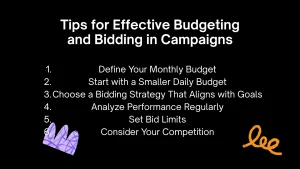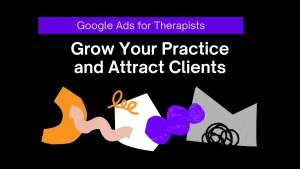Google Ads for Therapists: Grow Your Practice and Attract Clients
As more therapists start their businesses and existing experts add new services, the mental health field has become more competitive. Although valuable, word-of-mouth referrals rarely sustain a successful practice. Many therapists face challenges getting clients to come in regularly, having significant gaps between visits, and getting in touch with people who really need their help.
Digital marketing is vital for a private practice seeking steady clientele. Google Ads for therapists is one of the best ways to reach potential clients who are actively looking for mental health support out of all the online marketing strategies available.
Today, we’ll walk you through everything you need to know about using Google Ads to grow your therapy practice, from understanding the basics to launching your first campaign and optimizing for better results.
What is Google Ads for Therapists?
Google Ads is Google’s online advertising platform that allows businesses to show ads to those who are looking for specific keywords or browsing related websites. The platform auctions keywords related to marketers’ offerings. When someone searches for those terms, Google decides which advertisements to show depending on the amount of bid amount, the quality of the ad, and how relevant it is.
Google Ads for therapists has many advertising forms for therapy practices. When someone types in relevant keywords, search adverts show up at the top of Google’s search results. Local service advertisements promote your practice in a local business section on Google’s network of websites.

Google Ads’ targeting features are what make it a wonderful tool. Access people by geography, search behavior, demographics, and even the time of day they’re most likely to need your services. By using precision targeting, you can avoid casting a broad, costly net and make sure your advertising money reaches the most relevant potential customers.
The Benefits of Google Ads for Therapists
Traditional marketing approaches can’t match Google Ads’ benefits for therapeutic practices. Potential consumers are usually prepared to act when they look for mental health assistance.
Therapists who service specific locations or prefer in-person sessions benefit from the platform’s geographic targeting. You can see how well your investment is working using Google Ads.
Setting Up Your Google Ads Campaign
Therapists who want to reach out to new clients may find it easy and profitable to set up a Google Ads campaign.
1. Create a Google Ads Account
Sign up for Google Ads if you don’t already. Create your profile by following the instructions, including a link to your website if applicable. This will allow you to track your campaign’s effectiveness later.
2. Choose Your Campaign Goal
You can choose particular goals for campaigns with Google Ads for therapists, such as building brand awareness, generating leads, or increasing website traffic. Therapists prefer “Leads” because it encourages prospective clients to contact them.
3. Set Your Targeting
Select demographics that align with your target clientele and geographic areas (such as your practice area or specific zip codes) to define your ideal audience. Selecting mental health or therapeutic interest categories may further refine your targeting.
4. Conduct Keyword Research
Use Google’s Keyword Planner tool to uncover search terms that potential clients might use. Use high-traffic and specialist keywords to make your Google Ads for therapists relevant.
Practical Tips for Effective Keyword Research
- Start with Core Terms
- Analyze Competitor Keywords
- Focus on Long-Tail Keywords
- Consider Localized Keywords
- Review Search Intent
- Regularly Update and Expand Keywords
5. Craft Your Ad Copy
Create ads that are clear, interesting, and appealing to your target audience. Include an engaging headline and a summary of your services and advantages. End with a strong call-to-action.
6. Set Your Budget and Bidding Strategy
Divide your marketing budget into daily restrictions to create your daily budget. Start by considering how much you’re willing to spend every day to reach your target audience and achieve your marketing goals. Before scaling up, test your campaign performance with a smaller budget to learn which methods work best. Enter the amount you’ve determined to be a fair daily amount into your campaign’s settings.

For new Google AdWords campaign users or those who wish to maximize conversions within budget, “Maximize Conversions” is the optimal bidding approach. Google can adjust your bids for optimal results thanks to this automatic approach. “Target CPA” is ideal if you have a CPA and want more spending efficiency control. It allows you to set a specific amount you’re willing to pay for each conversion, helping you meet your cost-related goals while still driving results. Both strategies work, but the best Google Ads for therapists depends on your campaign goals and budget.
You will have a Google Ads campaign that is both effective and well-targeted, which will help you reach the people who are most in need of your services. You should regularly evaluate and adjust your adverts to maintain the best performance.
Optimizing Your Ads for Better Performance
A/B testing is a good way to start improving your Google Ads for therapists. Try different headlines, CTAs, and descriptions to see what works best. Try out different headlines, calls to action, and descriptions to see what works best for your audience.
Adding new, relevant keywords and negative keywords over time will help you avoid showing advertising for unrelated Google search results. Add ad extensions, such as location and call extensions, to your advertising to increase visibility and give more information, which will help potential customers get in touch with you. Finally, review performance metrics and change your campaign’s targeting settings to ensure your ads reach the proper people. You can make ads that work better and help you reach your goals more quickly by constantly changing and testing your campaigns.
Google Ads for Therapists: Measuring Ads Performance
Set up conversion monitoring to measure how successful Google Ads campaign is. It helps you to track important actions, like phone calls, transactions, or form submissions, so you can see exactly how your ads are producing the desired effects.
- Performance insights come from various crucial measures.
- Click-through rate shows how often people clicked your ad after seeing it, giving you a sense of how engaging your ad is.
- Cost per Click shows how much you spend per page visit.
- The conversion rate calculates the percentage of visitors who complete significant actions, such as contacting your company or completing a form.
- Cost per Acquisition shows how much each conversion costs.
Use Google Analytics and detailed reports in Google Ads for therapists to make decisions based on data. These reveal audience behavior and campaign efficacy. You can change your strategies based on how well they are doing.
Regular analysis and modifications keep your advertising optimized for optimal results. Keep testing and learning – success with Google Ads is a process!
Growing Your Practice with Strategic Google Ads
Google Ads for therapists helps practices reach potential clients when they need support. The platform is the perfect marketing tool for mental health practitioners aiming to establish long-lasting practices because of its flexibility, quantifiable outcomes, and targeted features.
Patience, constant optimization, and an openness to trying new strategies are necessary for Google Ads success. Set a low budget, target relevant keywords, and write ads that address your ideal clients’ needs and concerns. Refine your campaigns as you collect performance data, concentrating on what suits your practice the best.
Do you want more potential clients? Consider partnering with Webugol’s Google Ads specialists who understand the unique challenges and opportunities in mental health marketing. Our team can help you develop and optimize quality lead campaigns while you focus on helping clients recover and thrive.



